- Home
- Paul Ableman
The Twilight of the Vilp
The Twilight of the Vilp Read online
The Twilight of the Vilp
PAUL ABLEMAN
Contents
Title Page
Preface to the 2014 Edition
ONE
TWO
THREE
FOUR
FIVE
Copyright
Preface to the 2014 Edition
Paul Ableman – playwright, experimental novelist and screenwriter – was one of the most recognisable and well-loved literary figures of Hampstead.
When I first knew him, he was living in a penthouse flat in Fellows Road, which went through many metamorphoses during his long residence. It started off as a small bachelor pad in the wild late sixties, but expanded mysteriously over the years to accommodate more and more books, computers, his second wife Sheila, his younger son Tom, talkative dinner parties, and large summer parties of guests who would crowd on to newly sprouting balconies amongst the pot plants, sit on top of one another on settees, and yell at one another happily in crowded corridors. It was like the Tardis. There was much more room in there than you would have thought possible.
Ableman, too, though small of stature, contained multitudes. He was born in Leeds in 1927 into an unorthodox Jewish family. His father, Jack, was a tailor. His mother, Gertrude, wanted to be an actress, left his father and moved to London, to Hampstead, where she fell in love with an American journalist, Thurston Macauley. (I liked his mother, a flamboyant woman who used to make lively contributions to my class at Morley College, but Paul was more critical of her, and I guess he knew her a lot better than I did.)
Paul was brought up in New York with his mother and stepfather and sent to Stuyvesant High School, returning to England aged eighteen. He did his National Service in the Education Corps, in Gibraltar and Scapa Flow, then went to King’s College London to read English, but did not finish his degree, hanging out in Paris instead, writing erotic fiction.
His novels include I Hear Voices (1957), published by the Olympia Press (a work of which Maurice Girodias was very proud), As Near as I Can Get (1962), Vac (1968), The Twilight of the Vilp (1969, his first book to be produced by Gollancz), and Tornado Pratt (1978): these works were praised for their inventive language, bawdy high spirits, and originality of form by Anthony Burgess, Philip Toynbee, Robert Nye and other friends of the avant-garde.
But his first publication had been a play, written with his mother, Even His Enemy (1948) – produced in London as Letters to a Lady in 1951. Green Julia, his first full-length play, in which two young men discuss an absent mistress, was a great success at the 1965 Edinburgh Festival, and other surreal and experimental plays (such as Tests, 1966) followed, with the encouragement of establishment critics like Harold Hobson, but Ableman also wrote screenplays of a more popular nature. He described himself, proudly, as a freelance writer, and could turn his hand to many different genres, including general science books.
He made something of a speciality of ‘novelising’ BBC series, such as Shoestring (Shoestring, 1979, and Shoestring’s Finest Hour, 1980), Porridge (Porridge: The Inside Story, 1979, and others under the pseudonym Paul Victor), Hi-de-hi (Hi-de-hi, 1983), Dad’s Army (Dad’s Army: The Defence of a Front Line English Village, 1989), Minder (Straight Up: The Autobiography of Arthur Daley, 1991) and Last of the Summer Wine (Last of the Summer Wine: A Country Companion by Clegg, Foggy and Compo, 1992).
His embrace of the sexual revolution of the 1960s unwittingly exposed him to risks. In 1969 he published a book called The Mouth, a harmlessly entertaining and informative book about orality drawing on mythology, psychoanalysis, literature and art, and pleasantly illustrated with images from Magritte, Kitagawa Utamaro and other respectable sources. This provoked an obscenity case of some hilarity, which was very ably contested by Jeremy Hutchinson, and the book and its author were triumphantly acquitted. I appeared as witness for the defence and I hope made a good case for Ableman’s good heart, innocent intentions and literary merit.
Ableman’s first marriage to Tina Carrs-Brown ended in amicable divorce: they had one son, Martin. He married Sheila Hutton-Fox in 1978, with whom he had Tom. His emotional life went through periods of turbulence, but he was always an attentive and affectionate father. As he grew older, he grew milder and more benign (although his amazing shock of hair grew larger and wilder), and he remained an eccentric rather than a conformist.
He was a great walker, and liked to set off into the wilds with his compass, alone or with his wife and son, sometimes sleeping in the amazing expanding Dandy he attached to his car. He made a good gin and tonic in his Dandy, high on Exmoor. He loved the natural world as intensely as he loved the pubs of Soho. On my last walk with him, in the Chilterns, we sat in a field eating our sandwiches, watching a red kite, while he explained to me his theory of the mind, which he expounded in his last book. He was a wonderful talker, but never a deliverer of monologues: he was always eager for a response, and listened to the stories of others with keen curiosity.
The Secret of Consciousness (1999) concerns the function of dreams and the archival capacity and processing mechanisms of the brain during sleep. His claims have yet to be tested, although he maintained it would be easy to do so in a sleep laboratory. His scientist friends (who included Lewis Wolpert) were not persuaded by them. He believed that during sleep the brain sorts and stores diurnal sensory impressions, on a Twin-Data system, one pathway leading to consciousness, the other to the archival memory, and that identity is no more (or less) than the unique set, or narrative, of sensory data of each individual. He saw the novelist’s use of ‘interior monologue’ as an attempt to describe this fluid and ever-changing process of creation.
In later years he began to keep an impressively detailed journal – a sort of forerunner, as he saw it, of the blog – in which he noted domestic and social events and his thoughts on such disparate matters as Judaism, technology, the restaurants of Swiss Cottage and the acting techniques of Peter Sellers: a record of an enquiring mind which found all human life of interest.
Ableman bore his last years of illness with an exemplary mixture of stoicism, good manners and good humour that made his company a pleasure. He never complained, and retained his affectionate delight in others to the last.
Margaret Drabble
(Margaret Drabble’s obituary for Paul Ableman was first printed in the Independent on 31 October 2006.)
ONE
I had seventy-three replies to my advertisement. For two days, I didn’t open a single one. I just sat in front of the television set watching a long programme called “What’s Doing?”. The children moved in and out of the room, putting things into my lap. Amongst other things, they put telephone books, apple cores, telephones, foul underwear, baby foxes, drumsticks and coal into my lap. My wife made no attempt to stop them. During the entire period that I watched “What’s Doing?” my wife never came into the room. I had a faint impression that the seasons were changing outside. The foxes grew up in my lap, mated, had litters and finally left to look for lodgings in the cheaper suburbs. Still my wife stayed away. I had a feeling that she was boiling beef in the kitchen. Once, when “What’s Doing?” had shown some rivers and some clocks, the combination had proved insufficiently piquant to hold my interest and I had glanced out of the window. There I had seen three lorries full of beef and a file of butchers in white aprons bearing haunches and half-carcasses in the direction of our kitchen. This had generated in my alert mind a suspicion that my wife must have involved herself in some way with a surplus of beef. Later the house had become very warm and begun to smell like a beef kitchen and I had inferred that my wife must be cooking bulk beef.
Why?
We are a large family: myself, my wife, foxes, children, a television set, telephone
s—and we eat a lot of beef but I felt sure that my wife was cooking about fifty times as much beef as we could consume in a month. I felt like calling her and reasoning with her, reminding her of the fiasco with the bananas and the lemonade powder that blew off the attic roof.
I love my wife and I hate to upset her. So I did nothing, I thought up frilly, persuasive little endearments, embedded in which would be firm veins of protest against rotting beef, but “What’s Doing?” was so genuinely gripping, so—so full of stuff, and the chair was so warm and the seasons were slipping by with such docility—that I did nothing.
As “What’s Doing?” showed a pageant of certain historical figures: George Trinket, seventh Earl of Stagger, Timon of Dundee, Eggham the Cluck and Lady Vevy Greeze, the deaconess, combined with colour-pointed diagrams of the microstructure of a fruit fly’s genes, I suddenly felt an incontrovertible certainty that we were heading for beef trouble which a few tactful words might obviate. A fortnight later, as the hired gangers shovelled the reeking mess out of the house, I felt shame suffuse me, for my little wife wept pitiably.
Now I want you to know that more art than will be apparent to the lay eye has been expended in bringing the narrative to this point, for I should like you to note the idea that has been brought into prominence. That idea is shame!
Yes shame! For shame must be regarded as the midwife, if not actually the mother, of the present botched work. It was because I didn’t open those replies! Because I left them for two days unopened and during that time he got away!
Why did I leave them unopened? As I have said, the chair was too seductive and the ingenious producers of that charming, terrible, light-hearted and nightmarish review “What’s Doing?” were too successful. They held me rooted to my chair while the foxes ripened in my lap, the seasons floated past the window and stewed beef incredibly accumulated in the kitchen. As, too, he got away, the right one!
Yes, the right one! The one I should have had! The answer to any novelist’s dreams, the hero ideal, the anti-hero sublime, the protagonist to perfection! No, it’s too late now. I won’t redden old weals by dwelling on his superlative qualifications, for I lost him, lost him to —but why boost the competition?
And it was the first envelope that I did open when, with a nice affect of atoms and stripping girls, “What’s Doing?” ceased quivering through the ether, the very first!
“Dear Sir,
In reply to yours of the —, requesting applications for the position of Hero or Chief Character in a prospective novel, I should like to offer my services. I am a young—”
Long before I had come to the end of that outline for an infallible, runaway best-seller, the telephone was in my hand. This required little in the way of physical exertion since the instrument had, as mentioned earlier, been deposited in my lap at some point during the absorbing progress of “What’s Doing?”. Now, as I fumbled epileptically at the dial, it occurred to me that while the phone was in my lap its connections were upstairs in my study. We were adrift! The wires had been cut! The other phone? The one that normally served in the hall? Also in my lap! Also severed. For a moment I debated the superior wisdom of hastening from the house to the nearest phone box or skipping upstairs and tossing a few children out of the window. Austerity won and, with a fierce wail of anguish, I leapt from my chair and flew out.
Oh ho! Oh no! Not in this world, Jack! Not in a competitive society, mister. When do you think you’re living, boyo? In ancient Egypt or something? Really—dreadfully sorry, but—I mean, after all, you had nearly half a week in which to reply. I mean, my services are rather—well, sought after. No, I can’t really say when I’ll be available. I gather my present employer in planning—actually—a whole cycle of novels! So sorry—but—
Of the remaining replies, only three were of the slightest interest and it was slight indeed. So negligible, in fact, did I find it that for another week I took no further steps in the matter but devoted myself to my family. Amongst other things, I explained the nature of the prism to Sandra, who was studying herpetology.
“The prism,” I informed her, “is a thing that has coloured light stored inside it. This coloured light is held in the form of tiny waves that may or may not turn into particles at some vital stage in the whole proceedings. The mechanism of the prism is closely related to the nature of white light. White light is a very common substance and has a bland, pacific nature unless attacked. The origin of white light is the electric light bulb—”
“Did you know,” Sandra interrupted me, “that mummy has cooked tons of beef?”
“Have you, my dear?” I asked casually, noticing that my wife was in the room and grateful to Sandra for having given me an opening.
“Yes, tons,” admitted my wife.
“I fear it may go bad before we can eat it,” I chuckled.
“That is a distinct possibility,” she chuckled back.
For several more days I continued to devote myself to my family, outlining the life cycle of the corn flake for my son Richmond, who wanted to be a theatrical wig-master. I warned Richmond that few theatrical outfitters could afford a special wig-master and the accommodating lad immediately said:
“Then I shall do something else.”
For a few more days, before the beef had putrified sufficiently to cast a foul aura over the house, I revelled in family life. I climbed on top of a chest of drawers and pretended to be a boulder about to roll down on Ambrose, Sylvia, Mona and Dick who were pretending to be nimble chamois. I grunted loudly, as a boulder might, and they leapt nimbly about the room. I jumped off the chest of drawers and then lay supine. The image of an unknown planet swam across the ceiling and I instantly devised a new cosmology which I expounded to all the children including Harriet who had, I knew, just devised a cosmology of her own. I called my cosmology “What’s the Matter with Matter?” and I submitted it to Harriet for a critique which she supplied, demolishing its pretensions.
Once my wife, a short, healthy woman with the eyes of a dreamer, came into the room. She informed me that some Danes were battering at the kitchen door. I asked her if she thought they wanted asylum and she said she thought they probably did. Soon the Danes moved into the houses on either side of ours and bought a large number of automobiles. I sent one of my sons—I think his name was Egbert—round to offer them instant asylum if they ever wanted it and they tried to persuade him to be their chauffeur. Wilhelmina, a girl with a great deal of cunning and yet remarkably innocent, became infatuated with three of the Danes. At the same time she developed hostility towards them. If, for example, several of the Danes left their house, Wilhelmina would leave ours and move in the opposite direction. After that she would cross the road and then turn round and sneer at them. She studied Danish grammar but she made deliberate mistakes. She shouted things like “Help!” “Pig!” “Sexy boy!” and “Rotten Denmark!” at them in faulty Danish. They seemed to enjoy it.
Finally I replied to my three applicants, as follows:
Letter no. 1
Dear Professor Guthrie Pidge,
Please accept my warmest thanks for your exhaustive reply to my recent advertisement. Yes, I was most intrigued, intrigued and stimulated, by your suggestions. The experiences of an English University Professor lecturing in Literary Agronomy at a rural American college might indeed be the basis for a most successful novel (of which, as you are doubtless aware, I have turned out not a few in my day). A certain amount of reserve, however, and you will appreciate that if an association is to mature between us unlimited candour will have to govern our relationship, a certain amount of reserve then was my reaction to your admission that you have never, in fact, lectured in Literary Agronomy at a rural American college. Indeed, if I have—and we novelists are exceedingly skilled at so doing—correctly charted your adult history from your detailed letter, it would appear that you have not often left the city and university of Mushton. This fact need not be a categorical barrier to the proposed Novel but it would naturally affect the ter
ms of our association in which the Inventive or Imaginative component would have to be unusually large. Professor Pidge, I ask you candidly, would you consider a collaboration? Admittedly the terms of my advertisement specified the “Sole or Unique” hero of a forthcoming novel, but various technical considerations have led me to speculate whether, in the present case, our joint interests might not be best served by distributing weight and responsibility in the projected work amongst no fewer than three heroes. While I remain flexible in my plans, a positive attitude by you in this regard would undoubtedly strengthen the possibility of an ultimate agreement being reached between us. I look forward to hearing from you in the matter and I am, sir,
Yours etc.
Clive Witt
Letter no. 2
Dear Pad Dee Murphy,
Hope yak better. Thank you for card. What do reading and writing matter? Plenty can do that. Your friend do it. Me, I do it. Write. Write much. You plough with yak. I write with pen. I like to hear more. Perhaps book not all Pad Dee Murphy, but two more goodmen too. How’s that? You write, with friend, tell me. Perhaps I come. Much rice to you, Pad Dee! Greetings,
Clive Witt
Letter no. 3
Dear Mr. Glebe,
Your application would appear to rest on two major qualifications and I must say at the outset, quite frankly, that I feel grave doubts as to whether either of them, or both combined, would provide sufficient material for a major novel. Science fiction must still be regarded as a junior or ancillary department of literature incapable of providing a foundation for that delicate exploration of character and lofty moral edification which is the essence of the matter. Then again, what if your Earth Borer doesn’t work? And even if it does work what can you do with it? Only bore a little. You can’t go very deep because you might hit a sewer or a coal mine. I doubt if it would go very fast and it sounds dangerous as well. You would be restricted to boring around a little way under some field. This is not, you will appreciate, a very seductive proposition for a novelist. The other element you specify, the experiences of your son, a youth not yet in his third decade, hitch-hiking aimlessly around the country, would appear to be rather more promising. Nevertheless, you must permit my dependable and schooled judgement to conclude that we are not here in possession of a satisfactory formula. What I could suggest, if you would care to consider it, is that your son and your Borer be combined with certain other properties that I hope soon to have under my control for the purpose of attempting to produce a somewhat unorthodox perhaps but potentially very interesting work. Should this suggestion appeal to you, we can arrange a meeting in the near future to discuss the matter further. In the hope that your intelligence and savoir faire, as amply displayed in your letter, will dispose you towards this scheme, as well as mitigating your inevitable disappointment, I am, sir,

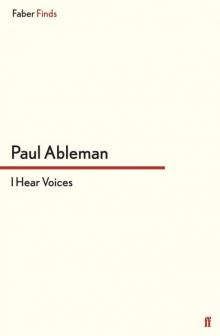 I Hear Voices
I Hear Voices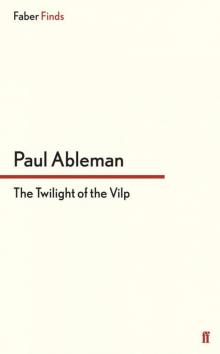 The Twilight of the Vilp
The Twilight of the Vilp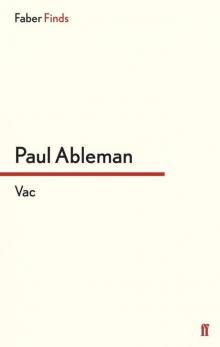 Vac
Vac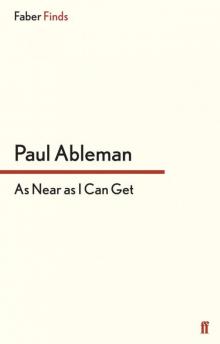 As Near as I Can Get
As Near as I Can Get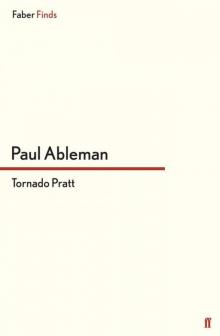 Tornado Pratt
Tornado Pratt